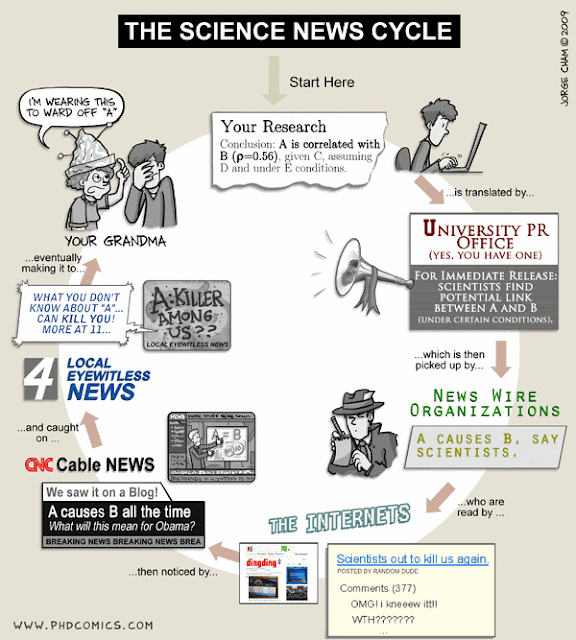Climate Change: Initiating the Dialogue - Part III
I recently got called a "child" on Twitter. And as much as I would like to take it as a compliment, I can't help facing that it was actually meant as a derisive remark to shut me up because .. well, the person who said that had nothing concrete to say. It began with a tweet from Nupur Sharma, Editor of OpIndia.com, tweeted:
‘Climate change’ has become like an off shoot of Islamism. No scope for discussion or debate. A contrarian view invites an immediate fatwa. A fatwa when climate change is not even being denied. The hypocrisy and doomsday predictions are merely being called out. https://t.co/Y4UZrTJALv— Nupur J Sharma (@UnSubtleDesi) September 25, 2019
[ Please check out the context of this tweet, if you have the time. It would be quite interesting to delve into it, but I would be straying away from the central point of my post. ]
To this, I replied:
Unfortunately, there really is no scope for discussion or debate considering, it's a matter of physics. Either you get it or you don't. You not getting it and not acting on it hurts me too. (1/2)— Shivangi Tiwari (@shivangi__t) September 25, 2019
So I try to explain it to you. But you still don't get it. Then I realize it's because you have earphones on. Political mantras that won't let you listen to science. I yank the earphones off. You have an issue. (2/2)
— Shivangi Tiwari (@shivangi__t) September 25, 2019
That's quite truly the central problem here. If climate change were like a disease -- say, I take precautions to not get affected, and I don't -- or like burning your home -- say, I don't burn my own home and my home doesn't get burned down -- it would perhaps be okay. It would be okay to let people be, as long as they are not harming me. But it isn't this way. The trouble is, we're all sharing a home here and we are burning it down.
Anyway, back to the conversation:
Physics evolved too. Even “matters of physics” need evidence beyond reasonable doubt. If climate change was an absolute truth and beyond reasonable doubt, a matter of physics, we should have been dead a long time ago according to doomsday predictions. Don’t just rant, child— Nupur J Sharma (@UnSubtleDesi) September 25, 2019
And to me, that is an ideal setting for laying down some ground rules for a sensible climate change dialogue.
Rule 0
(so basic, it shouldn't even need to be mentioned, but what the hell..let's do this for the sake of completeness)
No name-calling in a rational argument.
Seriously, if you have to resort to name-calling, it's clear you don't have any substance in your argument.
But now to the rules more pertinent to the climate conversation:
Rule 1
Learn your science from the relevant scientists.
- NOT the media
- NOT the popular interpretation of science by the media
- NOT the convenient interpretation of science by politicians
- NOT by WhatsApp forwards
Here's a cool illustration that I often share with my family and friends:
 |
| Source |
Ground reality is twisted by incomplete understanding and personal agenda on multiple levels. The climate conversation today has become so much like Chinese Whispers, but it really doesn't need to. Scientists have been writing reports for fellow scientists, policy makers and the general public, for decades now. There are summary reports that don't go unnecessarily deep into the technicalities, there are outreach articles on numerous university pages and it is now possible to interact directly with many scientists on Twitter.
The best place to get the facts today is the IPCC website. The IPCC stands for the Intergovernmental Panel for Climate Change. It is a UN body that releases reports after consensus with experts from all the countries across the world. It consists of experts from many fields - for eg,. economics, finance, humanities - and not just climate science. It releases reports for policy makers and general public in a manner that is simple for everyone to understand. Another awesome website is climate.nasa.gov.
Rule 2
While discussing the science, focus on the science.
Yes, the final policy cannot depend only on the science. Scientists understand that, and we do not ask that you keep science above everything else, because we do not understand the economic or sociological (or other related) perspectives. Since we do not understand about them, we do not dictate policy about those perspectives.
Understanding the science is step 1. Using scientific information to frame policy (with other inputs) is step 2. Step 1 is independent of step 2.
Rule 3
Cut the crap.
Science is not affected by your nationality, your political outlook, your religion, your ignorance or your level of apathy. The laws of this universe stays the way they are, whether you understand them or not, whether you care for them or not. A cyclone will hit the coast if it has to, and looking the other way will not lessen the damage.
Climate science is NOT about:
- Left wing or right wing
- India or the West
- Greta Thunberg - or Asperger's - or any leader - or what they're being portrayed as - or what you think of them - or what you think they're being portrayed as
- Miscellaneous controversy theories
- Generation X, Y or Z
- Any religion in the world -- seriously !
Rule 4
Admit to your ignorance / incomprehension.
It is okay to not know the technicalities of climate science. That's the job of the scientists after all. But having strong opinions based on half-baked knowledge is a bad thing for everyone -- it hurts you and it hurts everyone who listens to you. It's perfectly okay to say "I don't know how to cure cancer, you should go see an oncologist" or "I don't know much about climate change, let's listen to what the scientists say". Seriously.
-----
To summarise:
- Get your facts straight. Focus on the facts. The rest is consequential.
- Value expert opinions over those of climate quacks.
- Be responsible for your words and actions, because you're burning my home down too.
-----
If you like such posts, you may subscribe here.



Comments
Post a Comment